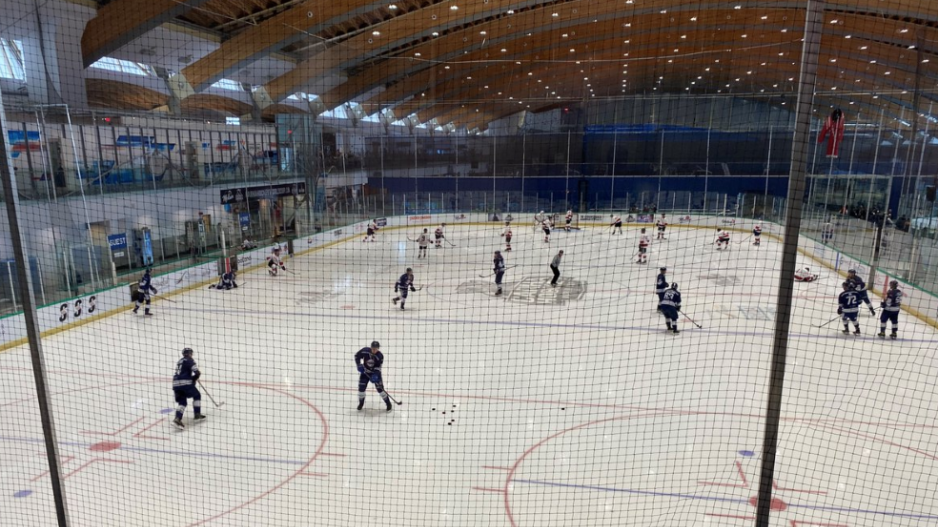I am at an age now where teams in my hockey league don’t discuss injuries. We’re getting to the stage now of discussing procedures.
Wayne Gretzky once let the world in on his secret sauce – the idea of success by skating to where the puck will be. In the leagues I occupy, teams generally skate to where the puck earlier went, even where it might never have been.
We note that the recently fired Vancouver Canucks coach, Bruce Boudreau, was hounded out of his job because of the team’s lack of structure. Bruce will always be welcomed in oldtimers hockey, where structure is a word from a different language, scrambled and securely tucked away in code for safe keeping.
If it sounds like a waste of time, it is anything but. Those three first paragraphs are indicative of the amusement and lack of self-seriousness in an exercise seriously intrinsic to our nation.
Oldtimers hockey is, someone once told me, the single largest determinant of Canadian masculinity. It’s a statement no one has successfully challenged when I’ve raised it, and it is relevant to a business column because for the men and the increasing number of women who play it and work, it offers a crucial respite from the factory and the office like nothing else.
More than 700,000 men are in leagues today (the statistics on women are lacking), while probably more than a million more casually play the game recreationally. Tally the many millions who have come and gone through organized hockey at one stage of life and you get the fuller picture of its epic impact.
Few countries have such a concentration of the male population on one sport as Canada does on hockey. Brazil (and, interestingly enough, Iceland) has soccer, India its cricket, Japan its baseball.
It furnishes health, tenders a key to identity, renders the joy of belonging, gifts the humble acceptance of age’s inescapable inevitabilities, provides the occasional reprise of vestigial youth, mandates the responsibility of collaboration, corrals the impulses of complaint and criticism and hyper-masculinity, yields self-deprecation and the dividends of game-by-game life lessons too lengthy to list.
I’ve lost count of the business contacts I’ve made and the dressing room sources only too willing to reveal intimate stories about government and institutions, at times with regret. But it’s the personal benefits that are far, far more valuable, and everyone who is in it, is in it for the camaraderie that comes with a club.
In the four decades I’ve goaltended, I’ve never met anyone who gave up the game because he or she hated it. It was due to an injury, a busy job (the evening shift collides with your ice time), the life-stage of the emergence or perhaps the challenges of family, and in some cases economic circumstance (it’s not a cheap game to play).
Almost anywhere there is a community and a rink, you can find a game at your age and stage, and that makes it a big business. Inflation in oldtimers hockey is a constant, whether in fees or gear.
The last major construction of arenas by the country goes back to Centennial year; the last major contribution by the country’s leader was Stephen Harper’s effort as prime minister to put a defibrillator in every arena. Adult recreation is a low political priority that deserves redress. Too many communities, including many in our midst, are ill-prepared for the boomers who will keep playing.
The pandemic hit the business hard, shut it down for months on end. And so it was alluring to participate in last week’s Canadian Adult Recreational Hockey Association (CARHA) World Cup in Richmond, originally scheduled in 2020 and pandemic-bumped into this year. It is the world’s largest international hockey tournament, staged every four years in Canada.
CARHA has been in the business since 1975 and is the country’s largest such organization, with 175,000 registrants. There were 98 teams with 1,500 players, coaches and trainers from nine countries: Canada, the United States, Sweden, Finland, England, Australia, Italy, Switzerland and Kazakhstan. There was a women’s division (the game is growing fast among women, thanks to our national team’s excellence and strong minor hockey support) and the Australians brought co-ed teams to play.
The Richmond Hotel Destination Association (RHDA) found lodging and helped CARHA arrange many logistics. It took more than 100 staff and volunteers to stage the week. There was an Athlete’s Village, excursions and late nights for anyone unworried about the effects on the next morning’s game.
It wasn’t an invitational tournament; any team could play, which had something to do with why one of my teams could. We were grouped in a division with similarly aged teams we assumed were similarly skilled. The Americans seemed surprised to beat us, the Swedes seemed surprised we were so easy to beat, and the team from Ontario seemed stunned we weren’t going to be beaten once again. If I’d wanted to spin it, I could say we came within an overtime loss of playing for the world championship in our division.
More accurately, we just loved being in the midst of teams that had saved money to fly here to join us locally. Win or lose, the post-game beer tasted the same.
Kirk LaPointe is the publisher and executive editor of Business in Vancouver and vice-president, editorial, of Glacier Media.




